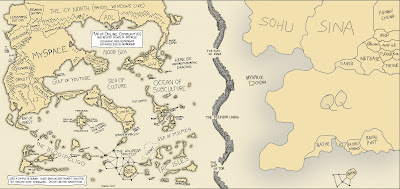In seems that one of our own, blogger Tim Johnson of China Rises, (as a side hobby he’s the Beijing correspondent for the McClatchy Newspapers & Junk Bond Imperium/Emporium) has become the target of a vengeful source. Tim recently wrote a piece entitled “China Orders Resettlement of Thousands of Tibetans”, and a Case Western professor of Tibetan Studies, who appears in the article, feels he has been misquoted. Here’s the relevant bits of Tim’s piece. First, the nut graf:
ZENGSHOL, Tibet – In a massive campaign that recalls the socialist engineering of an earlier era, the Chinese government has relocated some 250,000 Tibetans – nearly one-tenth of the population – from scattered rural hamlets to new “socialist villages,” ordering them to build new housing largely at their own expense and without their consent.
Indeed. Very concerning. Here’s his quotes of one Professor Melvyn Goldstein of the Center for Research on Tibet at Case Western University:
“”It’s created a building boom,” said Melvyn C. Goldstein, a social anthropologist and expert on Tibet at Case Western Reserve University in Cleveland. “I think it’s phenomenally successful, more than I would’ve believed.””
This is followed by a bit about how Human Rights Watch paints a bleaker picture. Then Goldstein is cited again at the end of the article:
“Goldstein noted that the settling of Han Chinese in Tibet’s major cities already has weakened the influence of traditional Tibetan elites. “The cities are a loss,” said Goldstein, referring to demography from a Tibetan point of view. “The last hope is to keep the villages intact. If there’s a battleground for Tibetan identity, it’s in the rural areas.””
When I first read this article, the first thing that leapt out at me was that it reminded me of alot of the ethnonationalism that permeates discussions of Tibet. The article says that the relocation recalls the massive social engineering of an earlier era – but wasn’t it just a few years ago that Peter Hessler wrote in Time Magazine, as did many others, about the forced relocation of Chinese along the Yangtze for the Three Gorges Dam? And didn’t that also mean rural villagers had to give up their way of life – their identity, as Johnson points out Tibetan identity is threatened by relocation? Yet Johnson’s article frames this as a unique crime being perpetrated against one ethnic group in China – Tibetans – using extraordinary measures that have not been used since “an earlier era”, even though less than a decade ago the complaint du jour about China, the catastrophe of the Three Gorges, involved the same problems and Han Chinese citizens? Here, I felt, was the same tired ethnically biased narrative we see about Tibet: the Tibetans suffer in extra-special ways compared to Han Chinese. I am willing to consider that more Tibetans are imprisoned, tortured, denied opportunities and face other forms of severe discrimination. I lived in Xinjiang, and the Uyghurs certainly do. But rarely does anything written about Tibet remark that Han Chinese often suffer the same problems – in fact, the tendency is to make Tibetans out as an isolated and special case.
But before I could write about that, a reader at BoingBoing and acquaintance of Dr. Goldstein submitted Dr. Goldstein’s response to Tim Johnson’s article. And I want to take a moment to tip my hat to Xeni Jardin for posting that readers comment and also linking to my critique of BoingBoing and another post they had. Xeni called me thoughtful. My heart flutters.
Key points of Dr. Goldstein’s complaint are:
1) he never said relocation was “phenomenally successful, more than I would’ve believed”, as the article implies. He said “a marked increase in the standard of living as rural Tibetan families are participating more and more successfully in non-farm income producing jobs for part of the year.”
2) “Initially the government’s idea was to have these new houses built along main roads, but this is not what is going on now in the areas we are conducting research in Shigatse prefecture,” says Goldstein, though Johnson states the government “claims that the new housing on main roads”.
3) Goldstein directly contests HRW’s claim, repeated by Johnson, that “None of those interviewed reported being given the right to challenge or refuse participation in the campaign”, when he wrote “Right now the villagers where we work have a 5 year window to decide whether to participate and rebuild”. Both claims could be correct – Tibet has more than one village. But this was not addressed in the article.
4) While HRW claims that villagers must take out thousands of dollars in loans to rebuild, Goldstein describes loans on a sliding scale based on relative wealth and what sort of housing they choose to construct.
5) Goldstein concludes “Consequently, as a result of this program. there is a building boom in rural areas that is affording rural Tibetans who are carpenters, stone masons, painters, and those who have tractors and trucks etc., increased access to non-farm income, and that is having a very positive impact on the overall standard of living. So in my view, this is a relatively benign program aimed at improving the quality of life and goes along with government interest in speeding up rural electrification, running water programs, etc. That is what I was trying to convey [in a previous interview].”
These quotes are all from an email Goldstein says he sent to Johnson before the article was published. Needless to say, it only furthers my belief that stories about Tibet are trimmed, folded, cut, bent and even broken in order to fit into the slot marked “Brutal Chinese Occupation of Tibet”, because apparently that’s the narrative it has to match. Any complications, grey areas, inconsistencies or problems are elided. When that narrative is repeated so often, do you know how alot of Americans will read such articles? They won’t. They skim it and say “Oh, dear, that Tibet is still suffering [like they did last week, last year, the year before that, ad infinitum]… what’s on the sports page?” And they won’t learn anything new.
As for Dr. Goldstein’s anger at being misquoted, I would suggest considering 1) reporters have editors who sometimes don’t know Tibet from a six-limbed starfish, 2) reporters have deadlines, and 3) remember Brad DeLong and Susan Rasky’s First Rule for Sources: Know Your Customers. The interviewee sets the rules, not the journalist. You can always decline to be quoted.
UPDATE: I contacted Tim Johnson about his article. He declined to comment and stands by the article. Fair enough.




